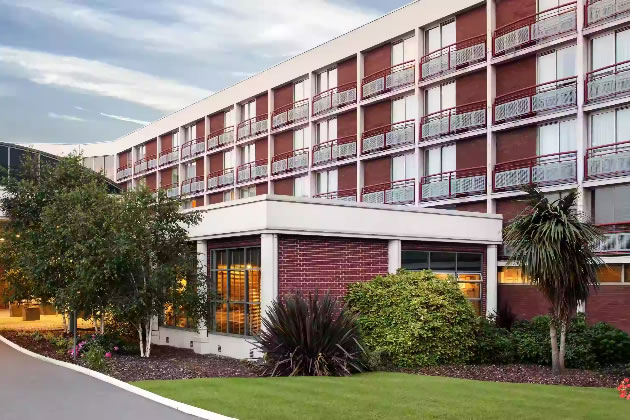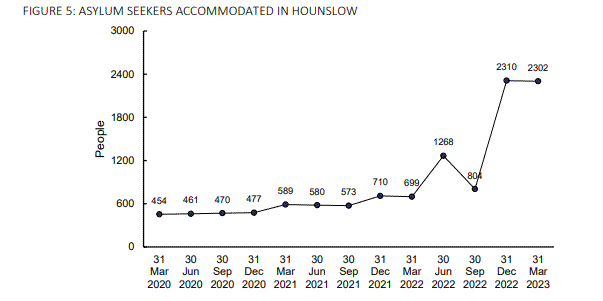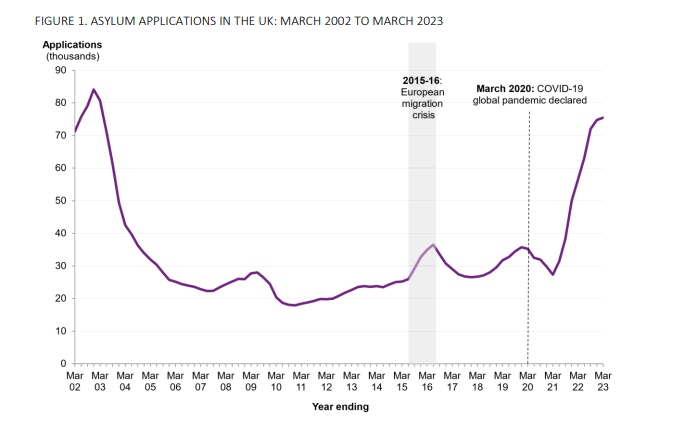Report Details Plight of Asylum Seekers in the Borough
Hounslow has second highest number in the country housed in hotels

Many of the hotels used lack communal areas
November 24, 2023
A report from Hounslow Council’s public health team has highlighted the growing problems created by the number of asylum seekers currently being housed in the borough.
Over the last few years, the Home Office has increasingly placed people waiting to have their asylum claims heard in local hotels, particularly those around Heathrow Airport.
As of March 2023, there were 2,302 asylum seekers housed in the borough up sharply from 454 in 2020 although the number is slightly down on March 2022 when it reached 2,310. About 70% of them had been placed in one of eight hotels. This is the second highest number of asylum seekers living in hotels in any local authority in the UK, with only Hillingdon, which also borders Heathrow, having more.
The report is quick to dismiss suggestions of hotels being an attractive option for asylum seekers. Kelly O’Neill, Hounslow Director of Public Health, states, “Anyone visiting the hotels being used by the UK government to ‘warehouse ’people seeking asylum can dispel the myth that this is luxury hotel living. Those living in these hotels have their lives on hold, waiting for the UK government to determine their future, a determination that for too many takes months and years. Eventually, more than 70% of those seeking asylum will stay in the UK.”
The report is advocating an ‘invest to save’ approach from the government in which better health care for people going through the application process would mean they were in better health, particularly mental health, when they are granted leave to remain. It is stated that there is solid evidence of the long-term health risks associated with unresolved trauma and the impact of adverse experiences and that these could be reduced with earlier intervention.
Although extra funding is provided by the Home Office based on the number of asylum seekers housed, the Hounslow asylum seeker population equates to 0.8% of the population and the report states that this creates additional pressure for the council, NHS, and voluntary sector organisation services.
In 2022, there were 87 unaccompanied asylum-seeking children who require a much wider range of support and places in local schools.
Since March 2022, Hounslow Council has received funding from the Asylum Dispersal Grant for each bed space occupied by a person seeking asylum in the borough. The council says that the cost of catering to the current number of applicants is significantly higher than this grant allocation.
A dedicated team works in the borough to coordinate asylum seeker support and work directly with the hotels. This team brings together local statutory service providers, and the voluntary and community sector to ensure essential services are available for pregnant women, children and families, and asylum seekers with acute and chronic health conditions. In addition, grant funding is provided for VCSE (Voluntary, Community and Social Enterprise) organisations to support asylum seekers.
The rise in the number of asylum seekers being housed is in part due to an increase in arrivals but also a slowing down in the processing of applications. Between April 2022 and March 2023, 75% of asylum seekers had been waiting for more than 6 months for their decision. In this pre-decision period, people seeking asylum in the UK cannot claim benefits and are usually not allowed to work unless they have a work permit.
The report is based on data from April 2022 to March 2023 but it is believed that the situation in the borough has deteriorated since then as a new Home Office policy to maximise the use of hotels means there are additional beds in each room to accommodate more people; with
strangers sharing rooms and an overall lack of personal space. Once an asylum seeking person is notified either way of whether or not their claim has been accepted, they now only have 6-10 days to find alternative accommodation and financial support.

Hounslow and Hillingdon are housing such a high number of asylum seekers because the hotels around the airport were used to isolate people during the Covid-19 pandemic and failed to return to previous occupancy levels once it was over.
Bed capacity for hotels used in the borough ranges from 12 beds to 1100 beds. Some of these hotels only accommodate single adult males while others are for single women and families or mixed groups.
Initially, they were meant to be short-term accommodation options with more permanent provision made within a few weeks but in practice some people have been in local hotels for over a year.
The hotels are generally situated close to the airport and busy roads and often have no communal areas. This means people are often required to carry out the basic activities of daily living, including eating, reading, watching television, and sleeping crowded into a single room.
Most do not offer access to a kitchen and the food provided to those in hotels is generlly pre-packed, airline-quality microwave-to-heat food, sourced from external caterers. This is causing additional health problems because of the inadequate diet and lack of variation.
Asylum seekers do have access to NHS health care , including prescriptions and dental care but the report found that the take up was limited. In some cases, this was because transport outside the hotel had to be booked three days in advance. The local public health team found that on site clinics were very successful in encouraging people to seek much needed treatment.
The cramped conditions and soulless existence are believed to be having a very detrimental effect on the mental health of people who already may be suffering with issues due to trauma some of which may have been undiagnosed. One meeting with a school aged girl revealed that she had witnessed her father being beheaded, she had been separated from her 10-year-old sister and was unaware of her whereabouts and that her mother never left her room because she was sick.
The report states, “Overall, there was clear direction that living in hotel accommodation contributed to a perceived loss of control, agency, dignity, and identity; loss of autonomy and basic physiological, safety and psychological needs such as a sense of belonging were not being met.”
A Hounslow local pilot of Primary Care services was funded and set up in 2022 to provide on-site outreach GP services for urgent health care needs in short-term hotels which are not part of the NHS England reimbursement scheme. This pilot demonstrated the impact of on-site clinics, which created opportunities to build rapport and trust with the hotel communities, which led to an increase in vaccination uptake, and reduced the risk of outbreaks of vaccine-preventable infection in high occupancy locations.
One local GP said in a focus group meeting with council staff that inadequate record keeping was creating unnecessary problems, “They should get a health check and some sort of health record created with immigration papers, and it should follow them through it, because otherwise we're giving vaccinations, but are we even sure that that information will go through to the next hotel where they're going go?”
With various ministries including the Home Office and the Department for Education having some responsibility for care of asylum seekers with day-to-day provision devolved to councils, the report believes the system has become dysfunctional. It states, “The experience of
local authorities coordinating support, health care and education for asylum seekers accommodated in their area is one of central government fragmentation and a lack of communication and effective joint working between the three departments involved. This fragmentation and silo working reduces the effectiveness of support offered to this large cohort of vulnerable people and places greater coordination responsibility on local areas.”
According to Home Office data there were 75,492 asylum applications in the UK in the year ending March 2023, more than double the number published in 2019, and 33% more applications than the year ending March 2022. Asylum seekers and refugees make up approximately 18% of UK immigrants to the UK.
The Home Office states that the increase in applications is due to the increase in small boat arrivals to the UK, which made up 44% of the asylum applications in the year ending March 2023. These have increased as a proportion because other ways of claiming asylum have been closed down.

In the year ending March 2023, Albanian was the most common nationality of people applying for asylum in the UK followed by those from Afghanistan, Iran, and India. The grant rate at initial decision is highest for those who came from Afghanistan, Syria, and Eritrea, close to 100% in some cases. The grant rate at an initial decision is lowest for those people from India, Bangladesh, and Albania; all considered safe countries with just over a third of Albanians receiving leave to remain.
Of the over 90,000 people who applied for asylum in the UK in the year ending March 2023, 62% were males aged 18 to 49, children made up 18% and less than 2% of asylum seekers overall were over 50.
The report concludes that government ministries need to adopt a more collaborative approach and that they should commit “to tackling the fragmented, siloed working relationships between the Home Office and other central government departments, including the Department for Health and Social Care and Department for Education that hinder a local area's coordination of local services required to support asylum seekers.”
In addition, it says that the government must recognise that areas with high numbers of asylum seekers housed in hotels need additional resources which would require more funding.
Going forward it is urged that the type of hotel being used for accommodation be reconsidered and that there should be access to communal areas both inside and outside the building and staff should be trained to understand and respond to the needs of asylum seekers.
The report will be presented to the meeting of the council due to take place on 28 November.
Like Reading Articles Like This? Help Us Produce More This site remains committed to providing local community news and public interest journalism. Articles such as the one above are integral to what we do. We aim to feature as much as possible on local societies, charities based in the area, fundraising efforts by residents, community-based initiatives and even helping people find missing pets. We've always done that and won't be changing, in fact we'd like to do more. However, the readership that these stories generates is often below that needed to cover the cost of producing them. Our financial resources are limited and the local media environment is intensely competitive so there is a constraint on what we can do. We are therefore asking our readers to consider offering financial support to these efforts. Any money given will help support community and public interest news and the expansion of our coverage in this area. A suggested monthly payment is £8 but we would be grateful for any amount for instance if you think this site offers the equivalent value of a subscription to a daily printed newspaper you may wish to consider £20 per month. If neither of these amounts is suitable for you then contact info@neighbournet.com and we can set up an alternative. All payments are made through a secure web site. One-off donations are also appreciated. Choose The Amount You Wish To Contribute. If you do support us in this way we'd be interested to hear what kind of articles you would like to see more of on the site – send your suggestions to the editor. For businesses we offer the chance to be a corporate sponsor of community content on the site. For £30 plus VAT per month you will be the designated sponsor of at least one article a month with your logo appearing if supplied. If there is a specific community group or initiative you'd like to support we can make sure your sponsorship is featured on related content for a one off payment of £50 plus VAT. All payments are made through a secure web site. |